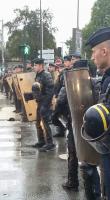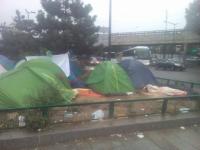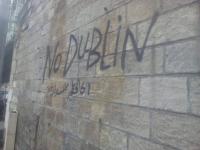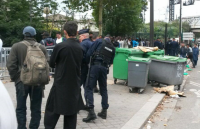“Life’s good”; a huge sign on a building reaching far above the streets right outside the city center of Paris. On streetlevel
below a few hundred refugees sleep every night. They wait to get access
to an asylum procedure in France and to get a sleeping place inside a
camp. Since spring of this year,
the amount of refugees and migrants on the streets of Paris is growing.
During the last months the number of new arrivals per day in Paris is
estimated between 80 and 200* The government made more places available in so-called Urgent-Housing-Centres or in CAOS’s (Centres de reception et orientation) for the first 3-6 months but because there were not enough places NGOs offered places in hotels: Herbergement d’urgence or ATSA’s (Accueil temporaire, service de l’asile)*. However, this was still not sufficient. Since spring a growing number of people sleep outside not knowing when or if they will get a safe place to sleep.
This is an impression of the situation in Paris, to show the world
howfar the borders of the Europen Union (EU) are reaching – not only at
the real borders of the EU, also not only around the bufferzone around
the EU, but also inside the EU. If you don’t have the right pass, you
are made to a second-class person.
Next to the traffic lights
Next to the busy junction of Porte de la Chapelle in
northern Paris next to the highway ring around 300 people sleep in
tents and under highway bridges. They chose this place because it is in
front of a camp for new arrivals. This camp provides around 400 beds.
From this camp one should be transferred to a more permanent place –
vacating place for new persons. The people waiting outside receive a
paper with a date, on which
they are entitled to queue in order to request a place inside. However,
almost every time they hear that they should return tomorrow.
The life outside is hard during this cold and rainy summer in Paris. Some have blankets or sleeping bags but too many people haven’t got enough to keep themselves warm during the nights. They have no access to clothes and showers. There are not enough toilets, only little fresh water is disposable. The only way to get access to these provisions is to enter the camp. These living conditions are inhuman, especially once you have realized where these people came from and what they have been through. Because most of the people are very weakened by the dangerous journey, they especially would need care and a safe place.
Other people who are already in their asylum procedure also have neither a home nor a shelter. For example Awad, a young man from Afghanistan who is around 20 years old, is already in Paris for 8 months. He has papers and his asylum procedure has already started. But roof and shower are not available for him. He is just waiting and doesn’t know what to do or where to go.
Queues
Everyday the camp takes in a small number
of people. So, everyday people queue waiting for hours sometimes even
through the night. When the camp starts taking people in the military –
apparently only white men – starts to control the queue, sometimes with
violent actions, holding pepper spray and guns (see pictures).
Refugees who live inside the camp can enter the camp by showing the camp’s card. The only other people allowed to enter are volunteers working for one of the French NGO’s. This NGO has a special deal with the state to work inside the camp, allowing them to distribute clothes etc.
Two criticisms can be made here. Firstly,
this NGO only works inside the camp, whereas much need is outside.
There are enough clothes and sleeping bags in their warehouse to help
those outside but the deal with the state prohibits them to distribute
on the other side of the gate. Because of this, registration in the camp is necessary for the people to get access to provisions. In this way, the NGO cooperating in the state’s goal of registration of refugees and migrants. Should this be a task as an NGO?
Secondly, among the refugees there are people who could help with the necessary work but they are not allowed without a European pass. For example, we met Ahmad in front of the camp who speaks five
languages. He offered to translate but his offer was rejected because
he didn’t have the right pass. In our view, this is a lost chance,
because it would mean a lot for someone in such inhumane circumstances
to regain some of his human dignity by bearing responsibility, using his
skills. Another man, Faisal, asked us where he could help. “You can feel good here because you can do something and help us,
but I want to do something as well!”. The NGO, not responding to these
requests, is seemingly not interested in what real solidarity looks like
and it should be asked who this deal is serving.
However, it is not only this NGO which is not responding to the requests of refugees to be able to life as an independent human. To feel human it is important to be in touch with friends and family. An important tool for these relationships is the phone. One day, Awad charged his phone in a
pharmacy next to the traffic square, but the next time he came the shop
owner refused his request by saying that it is “of course” not possible
“to come here everyday” and that he should try it somewhere else. Did
this man realize that Awad and the others live on the streets everyday and that for them there are no opportunities left than to ask, being dependent on others?
City of love
Jimmy who sleeps under the highway bridge in a tent told me that Paris is also called the city of fragrances and love. „But here I only smell
terrible scents. And love? How do we experience love here? From whom?“
He has a long journey behind him. Through the Sahara, where some of the
people of his group died, to the coast and from there they floated 4
days on the Mediterranean sea
without food and water. In Italy he saw refugees and migrants living in
the streets, unable to find a job. He decided to travel further. He
wants to work to give his family a peaceful life.
We came here with a lot of energy to work, to do
something, to live. But for a lot of us, here under the bridge we live a
life previously unknown to us: passive, without dignity. The waiting
and insecurity makes us crazy. There are no possibilities to do
something, to build on something. Look at this place, look at us. What
do you think? Like this, we cannot use our energy and our qualities.
Dublin deportations
Most people have one big fear: that the fingerprints
they had to give in another country in the EU will get them deported
back to these countries because of the first country principle. This principle states that a person who wants asylum in the EU can only ask for it in the first country of the EU he/she enters.
So every time a person asks for asylum, her or his fingerprints are
being checked in the EU-database for fingerprints and face recognition –
called EURODAC. When EURODAC reveals that someone has entered the EU in
another country, this person will be returned to that country, regardless of his/her personal biography or family ties. The
first country principle is an important part of the Dublin agreement,
the basic bill of the Common European Asylum System (CEAS). It is important to know that the Dublin-law will become stricter within the new CEAS which is discussed in the European Parliament at the moment.
Walking around the camp we noticed that a lot of people spoke German. It turned out that they have lived
in Germany and had heard that their asylum request is being transferred
back to another country. However, going back to Italy, Rumania, Greece or another southern/eastern country is no option. In most of these countries, like Bulgaria, a life for newcomers is even harder because of more racism and poverty among the population and institutions like the police.
Moreover, this year Bulgaria took only a few hundred people and rejected several thousands. So they hope that an asylum request in France will give them the opportunity for a real asylum procedure. One
of the boys in Paris said, while he was halfway laughing, halfway
crying, that perhaps he should cut off his fingertips, because he is so
afraid to be deported to Bulgaria. Hadas, a young Pakistanian lawyer,
had been asked by the Taliban to join them because he speaks many languages. Therefore, he fled his country, but unfortunately he experienced even more violence in Europe. He saw Bulgarian police beating up people in the streets without reason. Something like this, he never experienced in his life before.
Good life only with the right passport
In the city centre just a few streets away from Port the la Chapelle the „good life“ is being lived. Expensive restaurants, museums and shops are overloaded with tourists from countries all over the world. Here, every bed is warm, soft and secure. Here, you don’t see anything of the other life on the streets. The biggest difference between the tourists and those on the streets? Their passport.
We need to show solidarity with refugees at every level, and fight the CEAS!
Note: This impression was writen duringAt the morning of the
18th of August, Porte de la Chapelle was evicted for the 35 time in two
years through the Frence police. People were brought to different places
like sporthalls where they have a shelter for the first days or weeks. Ofcourse,
how people feel about this various from person to person and situation
to situation. Some are happy that they finally have a roof. Others feel
anxious through the registration which will maybe make them deport back
according to the first country principle. For sure, the police brutality
with which such an eviction happens is inhuman and shows how the state
is criminalizing refugees and migrants (see**).
Moreover, it is to be expected that within a few weeks, things will be returned to the situation discribed above. ***
Sources:





